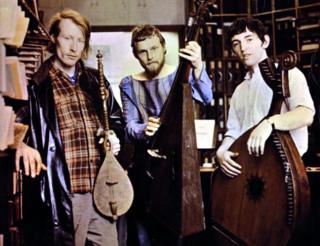 Image copyright Joe Boyd
Image copyright Joe Boyd The Incredible String Band were one of the most influential bands of the Sixties but their roots lie in the folk clubs of Edinburgh.
Their incredible journey took them from experimenting in Scotland’s all-night venues to an infamous appearance at Woodstock, the biggest counter-cultural event of the decade.
Led Zeppelin, Bob Dylan, the Beatles and the Rolling Stones were all said to have been influenced by the psychedelic folk rock of the band, who played “world music” a decade before the term was coined.
Comedian and banjo-player Billy Connolly, who was a massive fan and who got to know them when they played the folk clubs of Glasgow, described the band as “hairy, exotic and interesting”.
The story of how a group of folkies playing the Crown Bar in Edinburgh and late night clubs in Glasgow’s Sauchiehall Street rose to become musical pioneers, who are still revered around the world, is told in a new book by the Incredible String Band’s Mike Heron and long-time fan Andrew Greig.
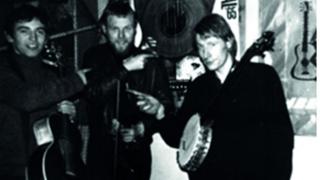 Image copyright Ian Ferguson
Image copyright Ian Ferguson Heron begins the story by telling how a middle-class, private school-boy was looking for an escape through music.
After playing in a rock ‘n’ roll covers band he got into folk music because he wanted to be a songwriter and “people in folk clubs actually listen to the words”.
Heron hooked up with established folk scene stars Robin Williamson and Clive Palmer as the Incredible String Band began to break out of its folk roots.
He says his band-mates were very much part of the beatnik scene, open to influences from all over the world.
“Clive was ultimate Beatnik,” Heron says.
“He lived in a tent pitched in a flat. He started off busking in Paris and he was grooved into it. Robin was too.”
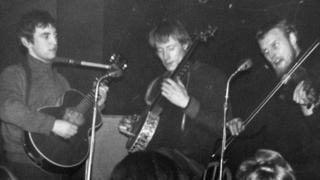 Image copyright Ian Ferguson
Image copyright Ian Ferguson Heron on the other hand was still living with his parents, who were pushing him to continue his training as a chartered accountant.
He says he admired Robin and Clive: “I was a bit like their apprentice at first.
“They were into Eastern mystic thought and all that kind of thing.”
At first the band played a mix of British folk, bluegrass and old-time jug band music.
But the music quickly progressed as they wrote their own songs and brought in influences from India (they’d seen Ravi Shankar in Edinburgh), Afghanistan, Morocco and even Bulgaria.
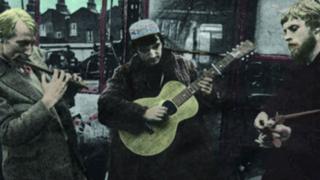 Image copyright Incredible String Band
Image copyright Incredible String Band Heron says: “We were listening to all these things but there was no-one playing the kind of thing we wanted to listen to, a composite kind of thing.
“We just played the kind of music people would like to sit around and have a joint to, interesting music that was made up of all these influences that seemed to be cool to the beatniks.
“We kind of invented this kind of music we wanted to listen to.”
The music caught the ear of American record company scout Joe Boyd, who was looking to set up a UK branch of Elektra Records.
He had stumbled across Robin and Clive in early 1965 and returned a year later to sign them up.
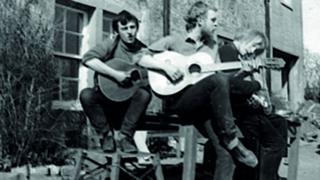 Image copyright Mary Stuart
Image copyright Mary Stuart By this time Heron had joined and they had become singer-songwriters. Boyd liked what he heard.
He has previously said: “Their lyrics turned out to be witty, romantic and literate, and the melodies soared. They had also started taking LSD, so were ahead of the zeitgeist curve.”
The Incredible String Band went to London, recorded their first album and immediately split up.
Heron says: “When the money trickled in from the first album and the three of us got an advance, Robin and Clive just took off.
“Robin just went immediately to Morocco and didn’t come back. Because people just did that in those days.
“Clive went off to Afghanistan for a good six months.
“Nowadays that seems amazing that a band has just made its first album and two of them toddle off around the world.
“I was astonished. I was not really a beatnik. I thought that was it, the band was over.”
According to Heron, Clive never really came back. He was not really interested in the band.
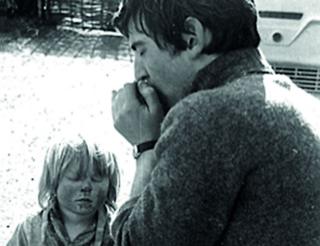 Image copyright Mary Stuart
Image copyright Mary Stuart Robin Williamson only returned to Edinburgh when the money dried up and the pair resumed ISB as a duo.
When Williamson did return he was laden with Moroccan instruments, including a gimbri.
Their second album The 5000 Spirits or the Layers of the Onion, which came out in 1967, was cited much later by David Bowie as one of the best albums ever.
It has been described by critics as the Summer of Love condensed into one album.
Its opening track, Chinese White, was the first time Andrew Greig had heard of ISB and it “blew my mind”.
From the weird North African instrument in the opening bars to the lyric which states: “The bent twig of darkness/Grows the petals of the morning/It shows to them the birds singing/Just behind the dawning”, the whole thing was a revelation to a 16-year-old school boy from Anstruther in Fife.
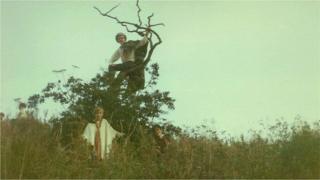 Image copyright Andrew Greig
Image copyright Andrew Greig Greig says: “I was a fan out in the provinces and lots of people around about me were turned on, there is no other word for it, by the band.
“There were no drugs available in East Fife at the time. The music just astonished us.
“There was a school folk club that was doing fairly earnest American protest songs and Scottish folk songs, there was also the Beatles and The Stones, which we loved, but we had never heard anything like Chinese White.”
Greig says: “The fact that they were Scottish and cutting edge, that’s what liberated us to think, ‘well if they can do it, we can do something like that’. It gave us permission.”
The young boy from Fife formed a band in the image of the String Band called Fate & Ferret.
He says: “We adopted their manner of dress and walked around the back-country in Fife with flutes and whistles and mandolins and sausages and cider.
“It was curiously innocent in a way. We had this idea of being travelling troubadours. It was that medieval and rural vibe.”
Greig, who has had a successful career as a writer, wanted to use his experiences with the band to “memorialise” the Sixties.
His book – You Know What You Could Be – takes its title from one of Heron’s early String Band songs.
Its lyrics sum up Greig’s feelings about growing up in the Sixties: “You know what you could be/Tell me my friend/Why you worry all the time/What you should be”.
He says: “It was that kind of liberation call.
“My story and Mike’s are both of people trying to become who they need to be when you don’t actually know who that is yet.
“They are both stories of formation. The ridiculous and often comic process by which you try to become who you need to be.”
Trip to Woodstock
In the book Mike Heron only tells the ISB story up to the point where Greig takes over.
However, there was much more to come including a trip to Woodstock, the famous festival in upstate New York in 1969 that has become one of the most iconic events in music history.
Heron says: “It was brilliant to be there but it was very primitive.”
He says the roads to the site were so choked up that they had to be flown in by a military helicopter.
“It was open at the side and the pilot kept going sideways so we could see these huge crowds below. Ravi Shankar was on the plane with us. He was not very relaxed.”
The band were supposed to have played on the Friday but it was pouring with rain and they were afraid they would be electrocuted.
The band were asked to play an acoustic set but by this time their girlfriends were in the band and Heron says it would have been “unchivalrous” to leave them out.
Instead they played in the baking heat of the Saturday.
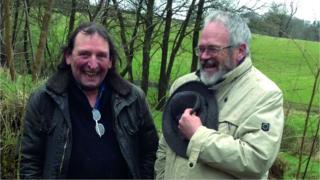
Heron, who is now 74, says: “It was very tricky to play there.
“The stage was high and rickety so that didn’t help. The music we were playing was quite delicate so when we went on on the Saturday it was a bit rowdy.
“Everyone had been dropping assorted drugs. They wanted things like Canned Heat. They didn’t want plinky, British, thoughtful music. It was too floaty. It wasn’t really what was required.”
The Incredible String Band split in 1974 but reunited for occasional performances from 1997 to 2006.
Andrew Greig says it is “astonishing” to be friends with and write a book with the man whose band he idolised as a 16-year-old in Fife.
He says: “On one level he is a god, a myth, a legend, an inspiration of my youth .
“On the other hand he is a guy who I spend time with, who I eat curry with. It’s an odd experience but a lovely one.”
You Know What You Could Be by Mike Heron and Andrew Greig will be published by riverrun on 6 April
Read more: www.bbc.co.uk

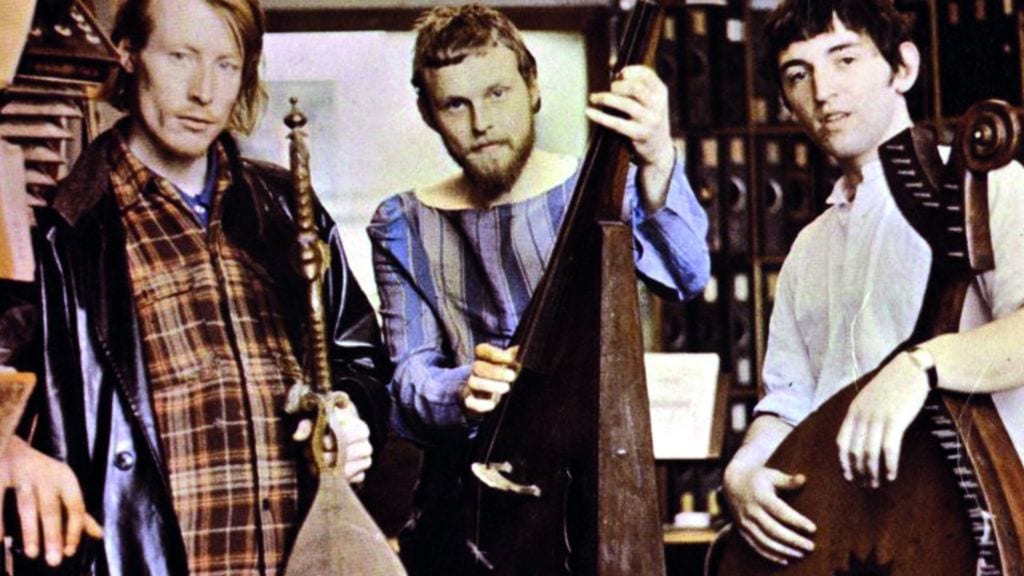







![[Video] How to get rid of bed bugs in Toronto](https://www.thehowtozone.com/wp-content/uploads/2019/10/maxresdefault-2-100x70.jpg)


